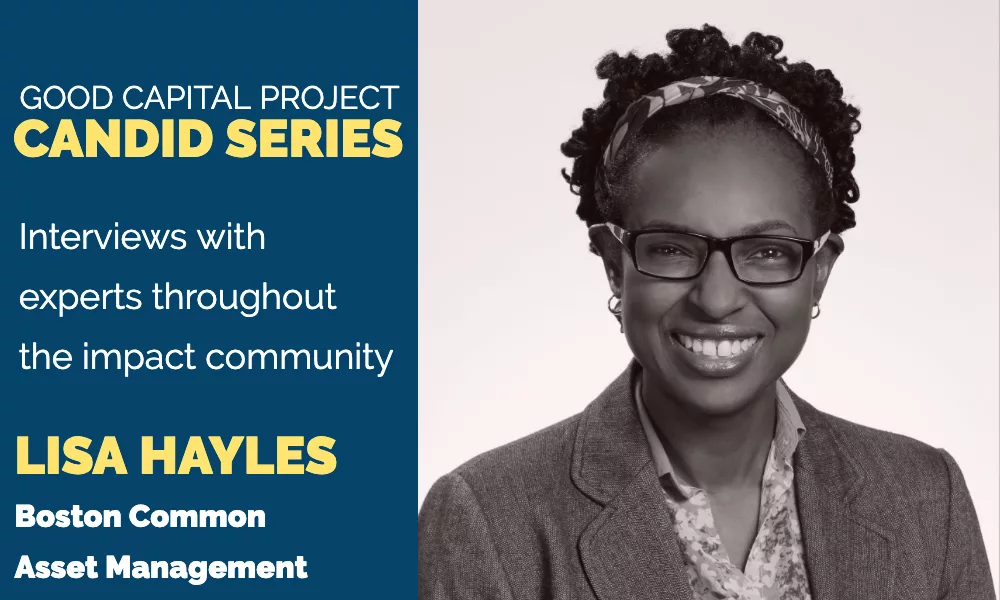
At Boston Common Asset Management, Lisa Hayles works with existing institutional clients and supports the development of new relationships with investors and consultants.
Good Capital Project: What’s your personal journey in the impact investing sector?
Lisa Hayles: I have an unusual profile compared to most investment professionals working in impact investing. I began my career working for non-profits, and organizations focused on international development, specifically microfinance. After I went to graduate school, I was offered a job as Assistant Director of the Responsible Investment Association (RIA) in Toronto, Canada. The RIA is a national organization for all sustainable and impact investors in Canada. At the time, impact investing was a growing but very small sector. I had the privilege and opportunity to work with the nascent players in the industry within Canada. A couple of years later, I was offered a job in London with Vigeo EIRIS. They are an ESG research firm for investors that was established in the early ‘80s. One of the clients I had at EIRIS was Boston Common Asset Management, which is where I work now.
I was drawn to Boston Common’s commitment to impact and using the capital markets to support sustainable growth and long(er) term thinking by companies – we believe this is necessary to ensure healthy financial returns. Boston Common is very intentional about trying to influence the capital markets to work in a more equitable way. At Boston Common Asset Management, we are applying a long-term lens to thinking about externalities that companies are generating because having a financial system where income inequality, environmental degradation, or pollution is increasing is unsustainable. We invest in companies who recognize those externalities, in terms of their own policies and procedures, because we believe they are going to be the long term winners. I am lucky to work with an investment manager that is committed to the twin goals of generating financial returns and achieving social change. As a firm, we are lucky to have clients who are attracted to us because of those twin objectives. We hope to see this pool of clients grow over time, both for our firm’s success and for the future of our planet, which requires companies to be more mindful of their positive and negative impacts on communities.
GCP: As you already implied, Boston Common Asset Management is notably dedicated to the pursuit of financial return and social change. Can you tell us about your role and responsibilities within this space?
LH: I have the best job as a business development specialist, as I serve as one of the links between our clients and the investment team. Since many of our clients are interested in Boston Common’s ESG integration work, my background in ESG research, analysis, and understanding of sustainability issues is helpful to them..I am also responsible for further developing our engagement work companies around gender equality, and racial justice.
We’ve seen for example, that bias against women on boards is not necessarily a conscious decision. However, if we want to change a system that has persisted for a long time, then we have to do it intentionally. Companies can’t just say they want women candidates, they have to revise their policies, mandate more diverse board candidates and track their progress in achieving their goals – publicly.. As a member of the Thirty Percent Coalition we collaborate with investors and others who encourage companies to include women and people of color in their pool of potential board candidates. We do this by advocating directly with senior managers up to the C-suite on the importance of diversity for better decision-making. We also encourage companies to formalize their board recruitment process, as board members are still found via the ‘boys club’ which is dependent on who you know and where you went to school. Unfortunately, using this strategy usually omits highly qualified women and people of color from the candidate pool..
In regards to our own diversity, Boston Common Asset Management was founded and continues t o be led by Geeta Aiyer, a pioneer in the sustainable investing industry. Women comprise more than half of our integrated investment team and we also have significant racial/ethic diversity at the firm. Given than we only have 36 staff we have a remarkable level of diversity in terms of geography, national backgrounds, languages and work experience. We think this enhances decision-making at the firm.We are also majority employee owned (I became a principal last year!) and wish to remain an independent ‘boutique’.
GCP: Why is it important to leverage shareowner engagement/shareholder advocacy to create greater diversity, inclusion, and gender equity within portfolio companies?
LH: The answer is three-fold – to serve our clients, our financial interests, and the planet. As investors, we need to use our voice to encourage companies to be more inclusive and sustainable in their operations.
However, the greatest drive has been from our clients. They want to see positive social and environmental impacts, as well as market-rate returns. There is also increasing demand from our client to invest in companies whose board members reflect the diverse demographic that is found in the United States for reasons relating to social justice and talent retention. This is the future. For example, by around 2050, the United States will be a majority-minority country. In order to ensure the vitality and continued success of a company, we need to ensure they integrate a much higher number of professionals who have been traditionally excluded from leadership. This is really an argument in support of capitalism, but a capitalism that is more inclusive and looks to benefit the largest number of people.
GCP: How can internal policy initiatives create a more equal and sustainable workplace?
LH: Taking credit for changes in the workplace is challenging since we work collaboratively with many of our sister firms. However, for the past two years, we have tracked Boston Common’s engagement impact through an annual report in which we describe our achievements in implementing equitable and sustainable policies.
As a firm, we have been successful in increasing the number of women on boards. For example, when we try to communicate with companies who haven’t responded, we may file a shareholder resolution in order to get their attention. We’ve filed shareholder resolutions on the issue of boardroom diversity over the last several years with different companies. In one case, we were able to have a conversation with the C-suite of a smaller company with mostly family members serving on their board. As investors, we want the company to do well and explain how diversity among their board can better serve them. The C-suite agreed to change the language around their nominating committee, and later that year, they appointed the first woman on their board. Although shareholder resolution brings leadership to the table, companies are also responding to a groundswell demand from a range of investors to have greater diversity on their boards.
GCP: Based on what I read in your piece on Racial Justice Investing, I’m curious about which trends or changes you’ve seen within racial justice investing?
LH: I think it’s fair to say that interest in racial justice ramped up after the federal election in 2016. Boston Common Asset Management has always had concerns about the fair treatment of communities, employees, and other stakeholder groups. To me, providing a racial justice lens means increasing representation and inclusion to change the culture of companies. As a firm, we are exploring how this lens can be more central in our approach to investing. We have never invested in companies that negatively affect communities of color, such as banks involved in predatory lending or private prison companies. We’re also researching how to encourage practices across our entire portfolio that are tilted in favor of greater justice and equity for all communities.
In addition to the blog I wrote, Boston Common Asset Management also submitted a testimonial to the Boston City Council about establishing an investment policy that would incorporate ESG issues. As investors, we were there to explain that ESG investing has no negative impact on financial returns. Basically, we were the ‘suits’ in the room to explain that the Boston City Council can successfully divest from private prisons or fossil fuels without operating outside their fiduciary duty.
GCP: In regards to discussing ESG policies and active ownership with the Boston City Council. Can you please share a little more about that testimonial and the City’s response?
LH: As I mentioned, the hearing was set up by three Boston City counselors in response to grassroots activism by a number of local community groups. I sat on a panel with a few other socially responsible investment firms to reassure the Council that it is possible to implement an ESG or SRI policy consistent with fiduciary responsibility. Our panel addressed common myths that exist, such as, ESG investing means accepting lower financial returns. Essentially, most of the critiques on ESG or SRI investing was a misunderstanding of the investment approach. It’s true that there is no standard approach for ESG or SRI investing, which can give different results depending on the strategy, but to paint the whole sector with that stigma is inaccurate.
The response from Boston City Council was positive. The morning of the conference, the city announced a new ESG policy which would apply to 10% of their operating assets ~ around $150 million. They also announced a $100 million fund that will be directed towards community investing in Boston, such as community banks and affordable housing. In addition to financial actions, the council became a member of Ceres, which is an environmental NGO based in Boston that is very active in shareholder engagement to influence companies to integrate ESG practices. We believe this is a good first step and encouraged them to use this as a stepping stone to adopt an ESG policy that covers all their assets.





